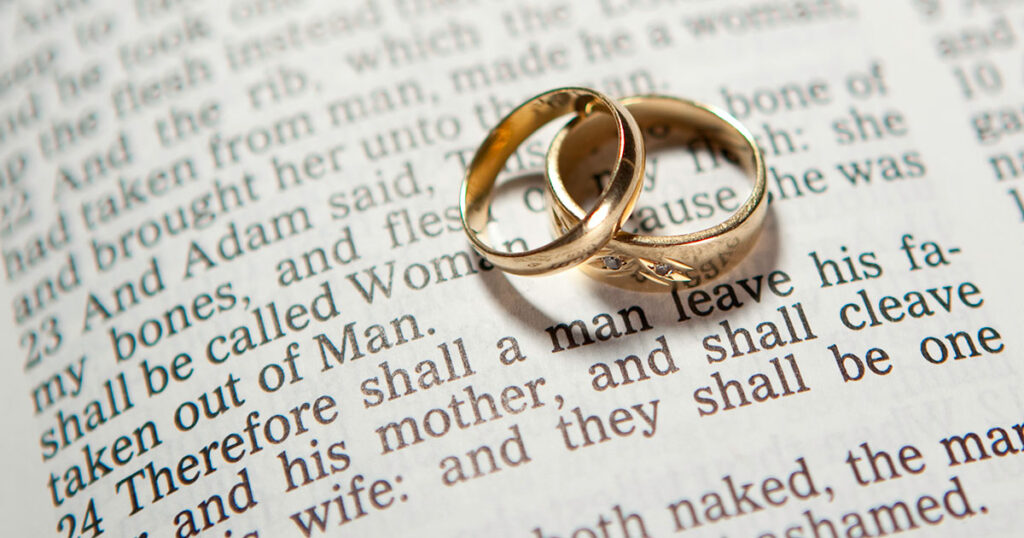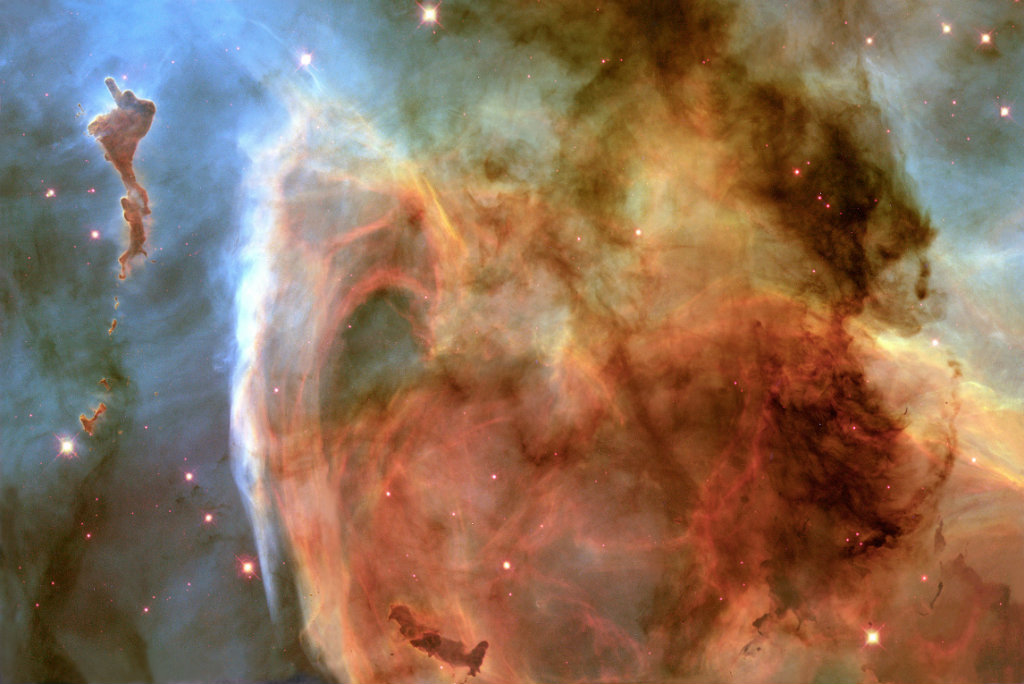Editor’s Note: Throughout the month of June, The Lutheran Witness will be sharing print articles from the past few years on topics of marriage, family and sexuality. Check back for more content each week in June, and view these and other articles here.
Creation and the foundation of marriage
By Jason D. Lane
“Bone of my bones and flesh of my flesh,” the man exclaimed, “she shall be called Woman, because she was taken out of Man” (Gen. 2:23). God had put the man to sleep, made the woman from his rib and presented her to the man (Gen. 2:21–22). The man’s response expresses the profundity and joy that he had discovered in her sameness; he is also clearly filled with relief. In her, he found rest and a true fulfillment of his godly desire (sexual, emotional, intellectual).
The woman is the prototype of every Christian bride. She is perfect, blameless and totally made for him. Thus, man rejoiced in the woman who was from him, and he rejoiced that God had brought her to him. To become one with her is a sweet image of God’s own union with man: “Let us make man in our image, after our likeness” (Gen.1:26). This first marriage speaks of Christ and the church (Eph. 5:32). This is a stunning mystery.
Woman’s creation in Genesis 2 is the foundation not only of the marriage of man and woman, but also of Christ’s marriage to His church. Although woman was taken from man’s flesh, they were made to be one flesh. Moses concludes this marvelous account: “Therefore a man shall leave his father and his mother and hold fast to his wife, and they shall become one flesh” (Gen. 2:24). She is his, and his love for her is inevitable. He will forsake even his own flesh and blood to become one flesh with her. There is no doubt that marriage is good.
When St. Paul quotes Genesis 2:24 to speak of the mystery of Christ’s marriage to the church, it changes our reading of Genesis 1–2. The creation of woman is more than just creation; it now also refers to God’s love for humanity. God instituted marriage before the fall into sin (Gen. 1:27–28; 2:18–25), and He has continued to bless it after the fall as a means to fill the earth, establish families, governments, tribes and nations of the earth. Without marriage society cannot thrive. And yet, this creaturely gift always points beyond creation to God’s salvation of mankind.
To say it more dogmatically, marriage is not isolated to the First Article of the Apostles’ Creed, but it is bound up in the Second and Third Articles. God has desired us and has not despised His creation. God became man to save us lost and condemned creatures. And the Spirit has brought us to Christ, sanctifying us through water and the Word (Eph. 5:26). As man would leave father and mother for his wife, Christ left His Father in heaven to become one with His Bride, even unto death, and to make her His own. The Spirit delivers to us Christ’s innocence and joins us to Him.
Made by God for God
As St. Augustine beautifully confesses to his Lord, “You made us for Yourself and our hearts are restless until they rest in You” (Confessions, Bk 1). We were made for Him, and we are incomplete unless we are one with Him. Marriage between a man and a woman, therefore, is a mystery because it reflects God’s love for His creation. And now, after sin, it reflects Christ’s union with humanity in His incarnation and the redemption of His Bride, the church, as St. Paul describes in Ephesians 5.
Christian husbands may have difficulty with St. Paul’s analogy in Ephesians 5, not only because we are not Christ and therefore fall far short of loving our wives perfectly, but also due to the seemingly selfish grounds for this love. St. Paul writes, “He who loves his wife loves himself” (Eph. 5:28). Until we see that God’s love draws us into His love and that He wants nothing more than to have us as His own, this teaching is hidden to us. Therefore, St. Paul is not offering some cliché about loving yourself before you love someone else. He means, rather, that Christ loves His Bride in such a way that He will not and hence cannot be without her. So when Saul persecuted the church, he persecuted Christ. The husband is to see his wife for what she is: his very own flesh. For Christians who know this truth, divorce is akin to self-mutilation. How could one rend his own flesh asunder? Or, as St. Paul observes, how could anything separate us from the love of God in Christ Jesus (Rom. 8:39)?
Christian women, in turn, may have difficulty with both Genesis 2 and Ephesians 5. Both seem to suggest that woman is incomplete unless she is with man. She is brought forth from man and is given back to man, without her say. The same can be said of the church, who, as St. John alludes to the heavenly marriage in his Passion narrative, is brought forth from the rib of Christ (John 19:34–35) without her say. The difficulty for the bride, as for all believers, is to believe that she is the treasure who has been desired, sought and won by the One Man (Matt. 13:44–52). Her activity, and that of the church, is to believe and receive.
An image of the church
Does this confession of marriage mean that there is no blessing in the celibate life? Of course not, as we see in 1 Corinthians 7. Each life has its blessing. But God attaches blessings to married life, despite its many anxieties for both husband and wife (1 Cor. 7:32–35). And the blessings are many. The bride is simultaneously an image of the first woman, brought forth from man and brought back to him, and an image of all humanity, whom God made in His own image and for Himself. She is also an image of the holy church, brought forth from Christ and made one with Him in Holy Baptism, and nourished by His Word and His own body and blood. If only every groom who stood at the altar of God saw his bride for what she is, the world would be filled with happy and blessed Christian marriages.
The wedding loudly confesses God’s love for us. He made us so that we would delight in Him and husband and wife would delight in each other. For this reason, Christians celebrate the wedding day and all that it entails — the groom’s love for his bride, the procession and presentation of the bride adorned in the white of innocence, the vows of love and the pledge of faithfulness, the marriage feast and the marriage bed — as a microcosm of salvation. “This mystery is profound,” writes St. Paul, “and I am saying that it refers to Christ and the church” (Eph. 5:32).
This article originally appeared in the May 2020 issue of The Lutheran Witness.
For more resources on marriage and the family, visit the LCMS Family Ministry page.




Since I am, male, over 79, and pushing towards the 80 mark, I can remember when most people in my life, my friends, relatives and co-workers, believed in marriage and wanted to find a special woman to share their lives, have children, and settle down. Even those not particularly religious held this view. Along came the turbulent 1960’s, and our world seemed to turn upside down, with people rejecting these virtues to “do their own thing.” Today, I know of many couples, unmarried and just cohabitating. Even more so, most do not want to have children as well. I suppose the Bible warned us how just a generation later, a Judeo Christian society may not only reject God and His word, but all sense of virtue and wisdom. I wonder if things will change, but I keep my expectations low, given the attitudes I see each day in America.